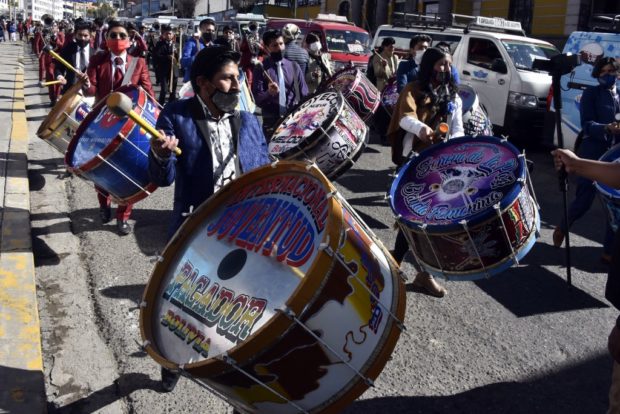LA PAZ, Bolivia — Bolivia’s Interim President Jeanine Anez on Tuesday proposed postponing the country’s general election a second time, citing an expected peak in the number of coronavirus infections in the South American country.

Musicians take part in a march of artists in La Paz on June 15, 2020 to demand Bolivian President Jeanine Anez to reinstate the Culture Ministry after earlier this month, in a cost-cutting move to free up money to fight the COVID-19 coronavirus pandemic, she announced it would fall under the education ministry. Photo by Aizar RALDES / AFP
The country’s legislature last week approved September 6 as the date for the elections, already delayed by the pandemic, although the decision still has to be ratified by Anez.
“Postponing probably for a month or two months is not going to hurt anyone,” Anez said in a speech in the southern city of Tarija.
A delayed election “means all Bolivians would win,” the right-wing leader said. She added however that she would “abide by everything established by the Supreme Electoral Tribunal, because we all want elections.”
The September 6 date was approved after an agreement between the Supreme Electoral Tribunal and the political parties.
However, Anez’s right-wing party abstained from the vote in Congress that approved the deal.
Conservative Anez, a former senator, has been interim president since assuming power in November after socialist leader Evo Morales fled the country following three weeks of protests over his controversial re-election.
Pressure is growing on Anez to ratify the new date.
Electoral Tribunal chief Salvador Romero said in an interview with Red Uno TV on Tuesday it was important to promulgate the law “to give certainty to the citizens and the country about the celebration of an electoral process that is essential for democracy in Bolivia.”
Anez last Friday sent a letter to Senate leader Eva Copa asking her to “take public responsibility” for the decision to hold elections on September 6, around the time when the government expects the pandemic to peak.
In her reply, Copa referred to the Electoral Tribunal agreement with the political parties.
If Anez doesn’t sanction the new law, under Bolivia’s constitution Copa could step in to ratify it.
Health authorities estimate that the country coronavirus epidemic will reach its peak in late July or early August, with some 100,000 infections and between 4-7,000 fatalities.
By Tuesday, the authorities had registered more than 19,000 infections with 632 deaths.